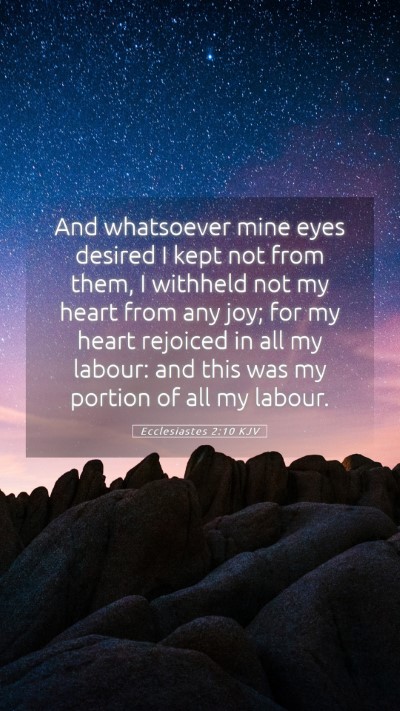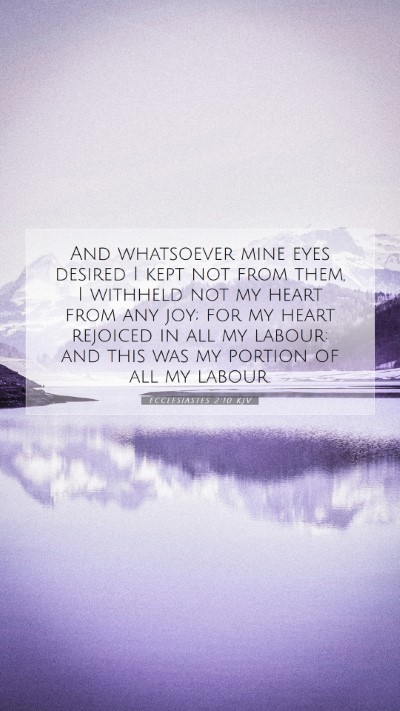Understanding Ecclesiastes 2:10: A Comprehensive Bible Verse Commentary
Ecclesiastes 2:10 states: "And whatsoever mine eyes desired I kept not from them: I withheld not my heart from any joy; for my heart rejoiced in all my labour: and this was my portion of all my labour."
This verse encapsulates the sentiments of Qoheleth (the Preacher), expressing a thorough exploration of the pursuit of pleasure and the satisfactions of life through diligent labor. By drawing on insights from public domain commentaries, we can deepen our Bible verse understanding and enrich our Bible study insights.
Interpretation and Meaning
Within this verse, Qoheleth reflects on his experiences, emphasizing two important themes: the indulgence in worldly desires and the fruit of one’s labor.
1. The Pursuit of Pleasure
According to Matthew Henry, this portion of the scripture illustrates a heart fully engaged in the pursuits of earthly delights. Qoheleth acknowledges his unrestrained quest for enjoyment, implying a deep sense of personal freedom and agency. The phrase "whatsoever mine eyes desired" suggests an unbridled indulgence in worldly pleasures.
2. The Role of Labor
Albert Barnes emphasizes the significance of labor, remarking that Qoheleth found joy in these endeavors. The connection made between labor and joy reveals the cyclical relationship between effort and satisfaction—how one's work can produce delights that render life meaningful.
3. Reflection on Contentment
Adam Clarke asserts that despite Qoheleth's exploration of pleasure and joy, there's an underlying message about the futility of such pursuits without divine purpose. Clarke posits that this self-indulgence might ultimately lead to emptiness if not balanced by an understanding of larger existential truths.
Key Themes and Insights
- Fulfillment in Work: This verse highlights the satisfaction derived from labor, asserting that hard work often leads to joy.
- Temporality of Pleasure: It invites readers to consider the fleeting nature of earthly pleasures, encouraging a pursuit of lasting fulfillment.
- Self-Reflection: This scripture pushes for introspection regarding what truly gives life meaning beyond mere indulgence.
Application to Daily Life
Understanding Ecclesiastes 2:10 can aid in various aspects of life, especially in how we perceive work and pleasure. Applying Bible verses to daily life involves recognizing the balance between effort and enjoyment:
- Evaluate Personal Desires: Reflect on what your eyes desire and consider the implications of those desires on your life.
- Find Joy in Labor: Seek fulfillment in your work, recognizing its potential to bring joy.
- Seek Lasting Fulfillment: Consider expanding your joy beyond physical indulgences to more enduring spiritual fulfillment.
Bible Cross References
- Proverbs 14:23: "In all labor there is profit: but the talk of the lips tendeth only to penury."
- Proverbs 27:18: "Whoso keepeth the fig tree shall eat the fruit thereof: so he that waiteth on his master shall be honored."
- Ecclesiastes 3:12-13: "I know that there is no good in them, but for a man to rejoice, and to do good in his life."
Conclusion
The study of Ecclesiastes 2:10 serves as a reminder of the complexities of human existence. Our Bible verse commentary shows that while the pursuit of pleasures is part of our human experience, there is value in labor and a dire need for contemplation on what truly satisfies the soul. Embrace this Bible study lesson as you navigate life’s pleasures and responsibilities.
By reflecting on these insights, you can deepen your understanding of scripture and enhance your engagement in Bible study groups or online Bible study initiatives, allowing for richer discussions on life's profound questions.


